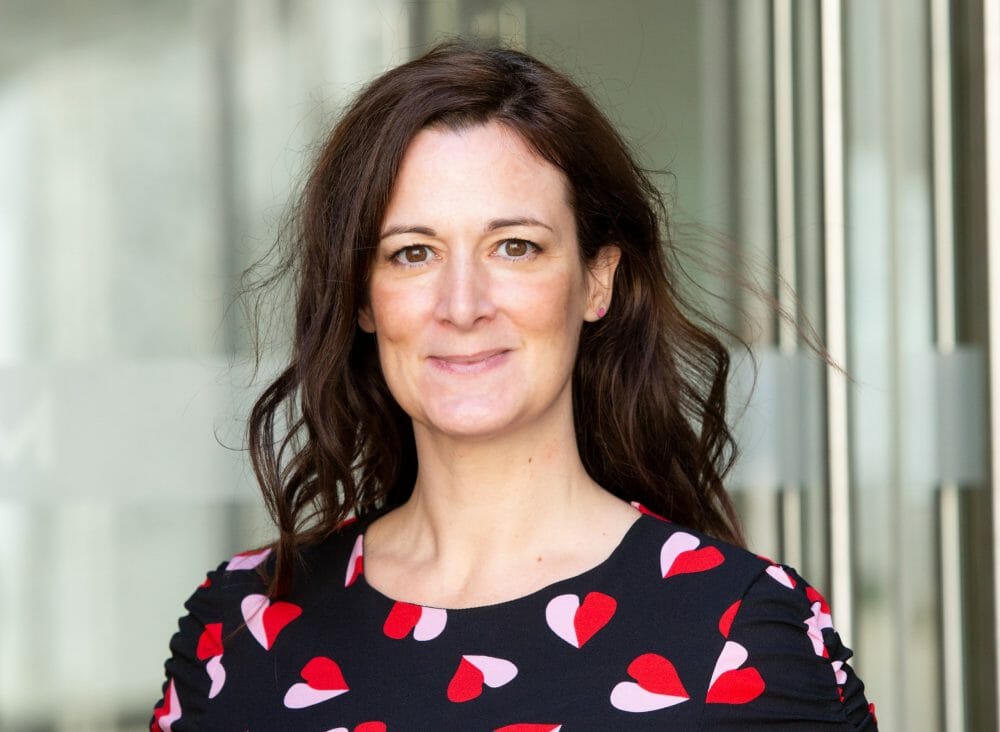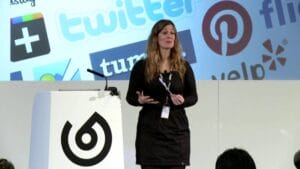
At Eticas our vision is a world where technology promotes justice and equality, and our mission is to protect people in technology and AI, and at the same time ensure we all have the right to benefit from AI innovation regardless of our gender, skin colour, location or background.
Gemma Galdon-Clavell Founder and CEO of Eticas Foundation, Spain
Gemma Galdon-Clavell, Founder and CEO of Eticas Foundation, Spain
2022 WE Empower Finalist, Europe and North America
Artificial Intelligence permeates culture and technology, from science fiction to smartphones and everything in between. Despite its ubiquity, there is a lot to learn and develop for such algorithms, including some crucial principles of ethics and accuracy. Eticas Foundation is calling attention to these important questions and paving the way for equitable, accurate, and effective technology.
Bias by design

Gemma Galdon-Clavell sees amazing potential in artificial intelligence. It can learn and adapt and organize more data than humans could ever have time for. Unfortunately, the risks are amplified along with the opportunities. Galdon-Clavell founded Eticas Foundation to ensure that algorithms meet their full potential by recognizing and treating all people and all information fairly and accurately. She points out how the data and designers that develop an algorithm pass on their own biases and expectations unless careful attention is invested to avoid doing so.
She says, “Vulnerable and marginalized groups, people of color, and people with lower socio-economic backgrounds see how their reduced chances in the ‘offline’ world are being reproduced and often reinforced in data dynamics.” While many digital systems work in the background of society, the impacts due to unseen bias are blatant in common tasks, too, like face recognition or credit inquiries. Eticas Foundation is working to find the right balance of efficiency and prudence when developing automated decision-making systems, hopefully inspiring the world to do the same.
Quality assurance
Eticas Foundation tackles a spectrum of possible concerns in AI with a variety of tools, including audits, research studies, and collaboration in both private and public sectors. As SDG 5 Gender Equality is fundamental to Eticas, there is even an algorithm that can assess the risks to victims of gender-based violence, called VioGén, which enables protection for the victims. “We are also looking at gender discrimination issues in social media content moderation,” Galdon-Clavell says, “in banking and in the platform economy, in different collaborations with governments and public and private institutions.”
Rather than restricting progress, Eticas Foundation encourages the development of automated decision-making systems to support SDG 9 Industry, Innovation, and Infrastructure. She shares, “We are a key actor to ensure that current technological innovation works for everyone, that it is subject to oversight and scrutiny, and that good players see their efforts recognized and so gain visibility and a competitive advantage by embracing responsible innovation solutions.” Eticas Foundation has now worked with several multinational organizations and is proudly making a difference.
Seeing the blindspots
Eticas Foundation focuses on all kinds of inequality. As inherently systemic issues, SDG 16 Peace, Justice, and Strong Institutions lies at the heart of Galdon-Clavell’s vision. She shares, “Ensuring that we automate processes but not democracy or values is crucial to strengthen trust and collaboration between people and the governance infrastructures that surround us and establish the playing field where we flourish as citizens and human beings.” There is hope that automated decision-making can actually see beyond human bias.
Before that can happen, however, algorithms need more clarity and better standards so that everyone affected by them can understand and appreciate them. In Galdon-Clavell’s words, “If the public sector is to rely on ADM decisions, the robustness, fairness, and trustworthiness of these systems will have a huge impact on how these institutions work and are perceived by the population.” Perhaps soon AI will seem more of a friend than a foe. To that end, Eticas Foundation is lighting the road towards more ethical algorithms in every sector and helping technology work more and more closely with our values.
Through targeting policy-making, we can help the public sector lead in the development of better, more just technologies that contribute to expanding existing rights and imagine new ones, instead of using technology to obscure unfair, unaccountable processes where established rights and guarantees are disregarded, and the impacted communities often ignored.
Gemma Galdon-Clavell
The WE Empower UN SDG Challenge is a first-of-its-kind global competition for women entrepreneurs who are pushing the UN Sustainable Development Goals and leading innovation in sustainability and climate change through their businesses. This Contributing Series highlights finalists of the Challenge whose work demonstrates how business models and social entrepreneurship can drive global impact.